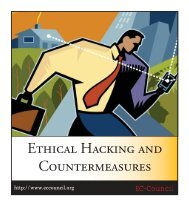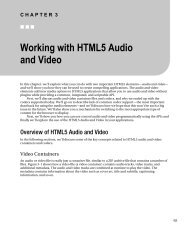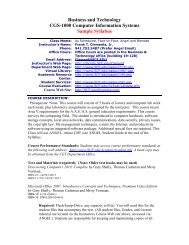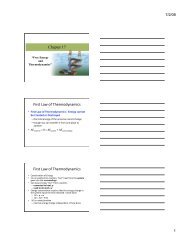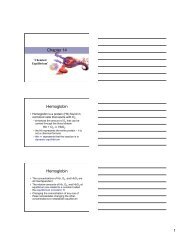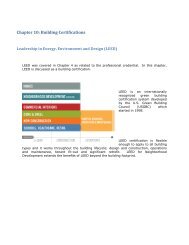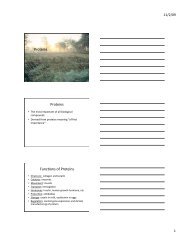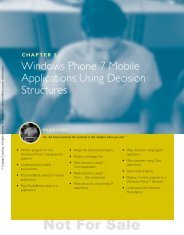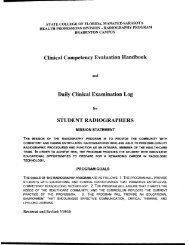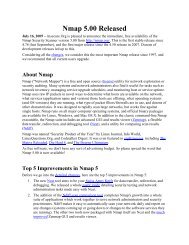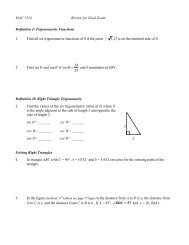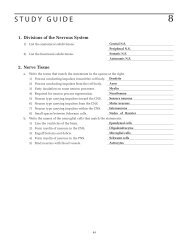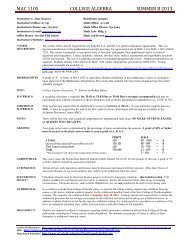Syllabus - Scf - State College of Florida
Syllabus - Scf - State College of Florida
Syllabus - Scf - State College of Florida
Create successful ePaper yourself
Turn your PDF publications into a flip-book with our unique Google optimized e-Paper software.
AML 2020- American Literature II Spring 2011<br />
Pr<strong>of</strong>essor Jeff Grieneisen<br />
Office 3-117 Phone: 752-5474<br />
Office Hours: TBA Email: grienej@scf.edu<br />
Course Description: Three hours per week. Prerequisites: ENC 1101 and concurrent registration in or<br />
completion <strong>of</strong> ENC 1102 with a grade <strong>of</strong> "C" or better. These courses meet Area IV requirements for the<br />
A.A., A.S., and A.A.S. General Education requirements, and the 6000 word Gordon Rule requirement. The<br />
second semester (1865 to present) explores literary Realism, Naturalism, Modernism and Postmodernism.<br />
In both courses, emphasis is on the richness <strong>of</strong> cultural, racial and gender diversity that constitutes the<br />
American experience. Either course may be taken first or separately.<br />
Course Performance Standards: See below for the performance standards <strong>of</strong> this course.<br />
Text and Materials:<br />
The Heath Anthology <strong>of</strong> American Literature. Vols. C, D, and E<br />
<strong>Florida</strong> English: Special Imagist Issue<br />
writing instruments (pencil/pen and paper)<br />
Attendance Policy: Attendance is an important part <strong>of</strong> the learning process in our class, and I take it very<br />
seriously. Attendance includes not only being here, but also being here on time. Therefore, I have developed<br />
stringent guidelines regarding course attendance: you are permitted one absence without academic penalty<br />
(however, you will lose the points on any in-class work or quizzes). After one absence, you will be penalized<br />
one letter from your FINAL course grade for each absence thereafter. You cannot miss more than three classes<br />
and still pass the course. Also note that I do not distinguish between excused and unexcused absences. Babysitter<br />
problems, personal illness, car trouble, and many other obstacles may be valid reasons for missing class,<br />
but they are not excused. In fact, it is precisely for these reasons that you may miss one class without penalty.<br />
Please do not present me with notes or documentation or extended explanation.<br />
* Tardiness is a separate but related issue. I count two tardies as an absence. Specifically, tardy is arriving after<br />
I have already taken roll. If you arrive tardy, it is your responsibility to see me at the end <strong>of</strong> class to ensure that I<br />
change your daily attendance record from "absent" to "tardy." (Do not disrupt the class, and do not wait until the<br />
next class period). Leaving early is the same as a tardy. Both are disruptive and rude.<br />
Grading Policy: All assignments are due on the listed due dates regardless <strong>of</strong> whether you stay in the class for<br />
that class period. As the semester progresses, I may determine to change some <strong>of</strong> these dates. You are<br />
responsible for these changes whether you are present or absent from class on the announcement day. Late<br />
assignments will not be accepted for credit (but must be turned in as per Gordon Rule requirements). We will<br />
discuss in class the grade criteria for A, B, C, D, and F work; please take notes during this discussion. You will<br />
receive detailed instructions for assignments; failure to adhere to these on individual assignments will adversely<br />
affect the grade you earn on that assignment. Also, do NOT put assignments in my mailbox; bring them to class<br />
and hand them to me.<br />
NOTE: All assignments MUST be completed—whether earning a grade or not—in order to earn a passing<br />
grade in this course.<br />
Gordon Rule: This course meets the <strong>Florida</strong> <strong>State</strong> Board <strong>of</strong> Education Rule Number 6A-10.30. In accordance<br />
with this rule, students will complete written assignments totaling 6,000 words. A grade <strong>of</strong> C or better is<br />
required for credit in Gordon Rule classes.<br />
Withdrawal Policy: In accordance with the <strong>State</strong> <strong>College</strong> <strong>of</strong> <strong>Florida</strong> policy, as stated in the college catalog,<br />
students may withdraw from any course, or all courses, without academic penalty, by the withdrawal deadline<br />
listed in the <strong>State</strong> <strong>College</strong> <strong>of</strong> <strong>Florida</strong> academic calendar. This semester, the withdrawal date is March 24.<br />
Students should take responsibility to initiate the withdrawal procedure but are strongly encouraged to talk with<br />
their instructors before taking any withdrawal action. In addition, students should note that faculty may also<br />
withdraw students for violating policies, procedures or conditions <strong>of</strong> the class, as outlined in individual class<br />
syllabi, and such action could affect financial aid eligibility.
<strong>State</strong>ment <strong>of</strong> Plagiarism: Plagiarism is the use <strong>of</strong> ideas, facts, opinions, illustrative material, data, direct or<br />
indirect wording <strong>of</strong> another scholar and/or writer-pr<strong>of</strong>essional or student-without giving proper credit. Instances<br />
<strong>of</strong> plagiarism, intentional or unintentional, will earn you an “F” in the course.<br />
Standards <strong>of</strong> Conduct: Students are expected to abide by all Lancer Student Handbook guidelines.<br />
Grading: *<br />
• Please keep in mind that this is a tentative list <strong>of</strong> assignments; our actual assignments and point values may<br />
vary slightly due to class progress.<br />
Grades on papers may be provided as letters (including plus and minus grades) that will be averaged with the<br />
numerical grades <strong>of</strong> objective exams to form the grade, itself.<br />
Formal Paper = 50 pts.<br />
Research Paper= 100 pts<br />
“Lessformal” Responses= 100 pts. (4 x 25 pts.)<br />
Midterm = 100 pts.<br />
Final= 100 pts.<br />
Quizzes/in-class work/Angel assignments= 50 pts.<br />
Total= 500 pts.<br />
A=90-100%<br />
B=80-89%<br />
C=70-79%<br />
D=65-69%<br />
F=64% and below<br />
* Students must earn a “C” or higher to successfully complete the course.<br />
Additional Information: Diligence, time management, promptness, and courtesy will go very far in this<br />
course. Please be aware, however, that as much as I appreciate hard work and effort, as a communications<br />
course I must grade the product <strong>of</strong> the course, your writing. I expect you to use great care in PROOFREADING<br />
your work; you are responsible for proper grammar, language usage, word choice, and logical and complete<br />
thought development.<br />
My Expectations: As you enter this classroom, I expect that you have a basic understanding <strong>of</strong> grammar rules<br />
and have mastered the focus and structure <strong>of</strong> the basic essay in ENC 1101. Also, I assume that you have<br />
completed ENC 1102. While you may take the course if you are currently registered in ENC 1102, you will<br />
likely be missing a lot <strong>of</strong> the background necessary to truly succeed in this course. ENC 1102 is an introduction<br />
to literature, while this course is more specialized, providing the foundation for reading, interpreting, and<br />
writing about literature. Additionally, both ENC 1101 and ENC 1102 should have required you to write a<br />
research paper in MLA format; I assume that you know MLA and will need only a brief refresher.<br />
I also expect that you will behave in a mature, respectful manner. Examples <strong>of</strong> behavior I do not tolerate<br />
includes, but is not limited to: applying makeup, or doing other homework during class; putting your head down<br />
on the desk; using unnecessary pr<strong>of</strong>anity for shock value; making slurs against individuals or groups; creating<br />
generally disruptive outbursts; making strange noises; and throwing things. I will deal with these on an asneeded<br />
basis. In the past, violations <strong>of</strong> these simple rules <strong>of</strong> courtesy have resulted in the student’s removal<br />
from the classroom, the student’s being reported to the Academic Affairs Officer, and in more modest cases,<br />
have caused students to lose grade points in the classroom. Additionally, as a courtesy, please refrain from<br />
wearing odiferous colognes or perfumes, as allergic reactions may cause your dismissal from the room (see<br />
attendance policy).<br />
Cell Phone Etiquette: Turn all communication devices to silent or <strong>of</strong>f (not to vibrate), and put them away—<strong>of</strong>f your<br />
desk. Do not text during class! If I am aware <strong>of</strong> your cell phone/Blackberry/IPod, etc, I reserve the right to deduct five<br />
points from your overall grade.<br />
* As time/resources permit, some assignments may require you to use ANGEL.<br />
A 4.0<br />
A- 3.7<br />
B+ 3.3<br />
B 3.0<br />
B- 2.7<br />
C+ 2.3<br />
C 2.0<br />
C- 1.7<br />
D 1.0
PERFORMANCE STANDARDS At the completion <strong>of</strong> the course, the student should be able to:<br />
1. Identify major primary texts/authors <strong>of</strong> the American literary canon.<br />
2. Trace the historical origin and development <strong>of</strong> major themes in American literary texts.<br />
3. Identify the major movements in American literary history: Realism. Naturalism, Modernism, post-<br />
Modernism.<br />
4. Demonstrate an understanding <strong>of</strong> critical and theoretical issues as contained in secondary scholarship.<br />
5. Distinguish between and among various literary genres.<br />
6. Demonstrate a knowledge <strong>of</strong> the vocabulary needed for the study <strong>of</strong> literature.<br />
7. Demonstrate increased reading skills through textual analysis, including the detection <strong>of</strong> tone, the detection <strong>of</strong><br />
bias, and the<br />
8. Demonstrate increased college-level writing skills through the execution <strong>of</strong> literary journals, study questions,<br />
essay tests,<br />
9. Fulfill the writing requirements as mandated by SBE 6A-10.30 (Gordon Rule).<br />
10. Demonstrate academic research skills, including the use <strong>of</strong> current documentation methods.<br />
11. Demonstrate the use <strong>of</strong> academic technological skills such as internet research, PowerPoint presentation,<br />
and online communication.<br />
12. Demonstrate the ability to interact effectively with peers by participating in panel presentations and/or group<br />
projects.<br />
13. Demonstrate an understanding <strong>of</strong> his/her role in a global society formed from a diverse population.<br />
14. Demonstrate a knowledge <strong>of</strong> major authors from diverse cultures and <strong>of</strong> literary movements <strong>of</strong> global<br />
significance.



